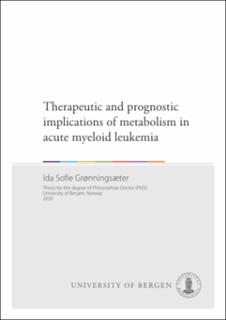Therapeutic and prognostic implications of metabolism in acute myeloid leukemia
Abstract
Acute myeloid leukemia (AML) is a highly aggressive form of blood cancer, characterized by an interruption in the differentiation process and by rapid proliferation of immature myeloid leukemia cells leading to bone marrow failure. On a molecular level, multiple genetic and epigenetic alterations are detected in hematopoietic progenitors that may contribute to disease progression, which results in the considerable inter- and intraindividual heterogeneity of AML clones. This heterogeneity also contributes to high plasticity in metabolic reprogramming, allowing cancer cells to maintain proliferation and cell growth under the high demands of expanding growth. Leukemia cells may employ different metabolic routes based on the molecular alterations of the disease, and this may in turn imply that certain AML patient subsets have common metabolic characteristics. These AML subsets may either have a more extensive adaptive capacity, or be more sensitive to therapies targeting metabolism. Thus, it may be possible to stratify patients according to metabolic phenotypes/capacities, which in turn may serve as a common therapeutic target. In the four papers presented in this thesis, we investigated AML cell metabolism, either as a possible target for treatment (Papers I and II), or to examine if metabolic alterations in AML patients might have prognostic value (Papers III and IV). In the first two papers, we studied the in vitro antileukemic effects of eight different metabolic drugs (metformin, 2-deoxy-D-glucose (2DG), 6-aminonicotinamide (6AN), BPTES, ST1326, lonidamine, AZD3965 and chloroquine (CQ)), alone and in combination with chemotherapy (AraC), targeting different metabolic pathways and proteins involved in the regulation of cancer cell metabolism. In addition, we studied the metabolomic profiles of AML patients, (i) before and after treatment with disease-stabilizing therapy including all-trans retinoic acid (ATRA) and valproic acid, and (ii) in cases of chronic graft versus host disease (cGVHD) after allogenic hematopoietic stem cell transplantation (allo-HSCT). We aimed to see if alterations in systemic metabolite profiles can be used as a prognostic tool to help determine which patients might benefit from cGVHD treatment. The results presented in this thesis confirm the heterogeneity of AML patients as regards susceptibility to metabolic targeting agents. A subset of patients with generally high sensitivity to multiple metabolic drugs was identified using an unsupervised hierarchical clustering analysis based on the antiproliferative effect of metabolic inhibitors. We saw that the clustering of this subset was largely driven by the patient cells´ sensitivity to metabolic drugs effecting the glycolytic pathway, supporting the idea that glycolysis is the main metabolic pathway for many types of cancer. We saw that the majority of our AML patient cells were sensitive to CQ, a known inhibitor of late-stage autophagy, also used to treat malaria. CQ proved to have antileukemic effects, and interestingly there was also a smaller subset of patient cells that showed high in vitro susceptibility to CQ, but on whom standard chemotherapy (AraC) had little or no effect. We did not however identify any significant molecular similarities among the patients with similar response to metabolic inhibitors, nor did we find correlations to any of the known prognostic markers (i.e. secondary versus de novo, AML cell differentiation (FAB classification, CD34 expression), karyotype, FLT3-ITD or NPM1 mutations). Our studies also showed that systemic metabolomic profiling can be used to examine effects of treatment with ATRA and valproic acid. We observed alterations in the amino acid and lipid profiles when studying ATRA and valproic acid as monotherapy, and changes were most apparent after valproic acid treatment. Even though, patients with rapidly progressive disease showed extensively altered lipid metabolism, pretreatment metabolite profiles could not be used to distinguish responders from non-responders to this AML-stabilizing treatment. Metabolic profiles were also altered in patients with cGVHD after allo-HSCT compared to patients without signs of cGVHD. We were able to identify a subset of 11-metabolites not effected by immunosuppressive treatment, that might have both diagnostic and prognostic value for cGVHD. To conclude, AML patients are heterogeneous with regard to susceptibility to metabolic inhibitors, and further investigation has to be conducted to identify common therapeutic targets. Patients are heterogeneous also with regard to their metabolic profiles, making it challenging to analyze and identify significant changes of single metabolites. However, our studies show that changes in metabolomic profiles may influence both epigenetic regulation and bone marrow microenvironment. These changes may in turn modulate disease progression as well as contribute to therapy resistance, thus giving metabolomic profiling a potential prognostic value.
Has parts
Paper I: Ida Sofie Grønningsæter, Håkon Reikvam, Elise Aasebø, Sushma Bartaula-Brevik, Øystein Bruserud and Kimberley Joanne Hatfield. Targeting cellular metabolism in acute myeloid leukemia and the role of patient heterogeneity. Full text not available in BORA.Paper II: Ida Sofie Grønningsæter, Håkon Reikvam, Karen Marie Hagen, Sushma Bartaula-Brevik, Øystein Bruserud and Kimberley Hatfield. Effects of the autophagy-inhibiting agent chloroquine in acute myeloid leukemia. Full text not available in BORA.
Paper III: Ida Sofie Grønningsæter, Hanne Kristin Fredly, Bjørn Tore Gjertsen, Kimberley Joanne Hatfield and Øystein Bruserud. Systemic Metabolomic Profiling of Acute Myeloid Leukemia Patients before and During Disease-Stabilizing Treatment Based on All-Trans Retinoic Acid, Valproic Acid, and Low-Dose Chemotherapy. Cells. 2019. 8 (10). 2073-4409. The article is available in the main thesis. The article is also available at: https://doi.org/10.3390/cells8101229
Paper IV: Håkon Reikvam, Ida Sofie Grønningsæter, Knut Anders Mosevoll, Roald Lindås, Kimberley Joanne Hatfield and Øystein Bruserud. Patients with treatment-requiring chronic graft versus host disease after allogeneic stem cell transplantation have altered metabolic profiles due to the disease and immunosuppressive therapy: potential implication for biomarkers. Frontiers in Immunology. 2018, 8 (2). 1664-3224. The article is available in the main thesis. The article is also available at: https://doi.org/10.3389/fimmu.2017.01979
